March 2025
The global smart transportation market is forecasted to expand from USD 105.77 billion in 2025 to USD 269.55 billion by 2034, growing at a CAGR of 12.36% from 2025 to 2034.
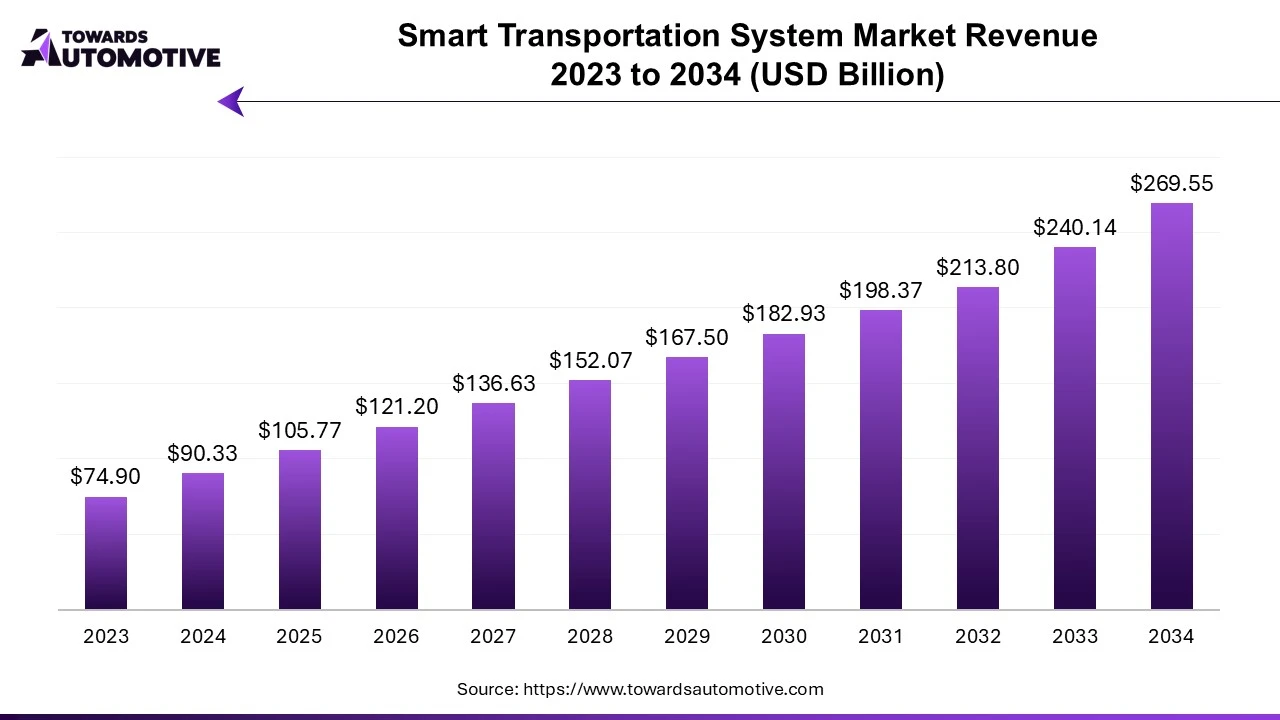
Unlock Infinite Advantages: Subscribe to Annual Membership
The smart transportation market is experiencing rapid growth, driven by the increasing need for efficient, sustainable, and integrated mobility solutions in urban environments. As urbanization accelerates globally, cities are facing unprecedented challenges, including traffic congestion, pollution, and limited resources. In response, smart transportation technologies, such as connected vehicles, intelligent traffic management systems, and advanced public transportation solutions, are being developed to optimize mobility and enhance the overall transportation experience.
Key components of the smart transportation market include Internet of Things (IoT) connectivity, artificial intelligence (AI), and big data analytics, which enable real-time monitoring and data-driven decision-making. These technologies facilitate dynamic traffic management, reduce travel times, and improve safety through better incident detection and response mechanisms. Additionally, the rise of electric and autonomous vehicles is reshaping the market, promoting sustainable practices and reducing reliance on traditional fossil fuels.
Moreover, government initiatives and investments in smart city projects are further fueling the growth of this market, as policymakers prioritize intelligent transportation solutions to address urban challenges. As a result, the smart transportation market is poised for significant expansion, with innovative solutions transforming how people and goods move within cities, ultimately contributing to a more efficient and sustainable future.
Artificial Intelligence (AI) plays a transformative role in the smart transportation market, enhancing the efficiency, safety, and sustainability of transportation systems. AI algorithms analyze real-time traffic data from various sources, including sensors, cameras, and GPS devices, to optimize traffic flow. This helps reduce congestion, minimize travel times, and improve overall traffic conditions by dynamically adjusting traffic signals and routing vehicles.
AI-driven predictive analytics enable transportation agencies to forecast traffic patterns, accidents, and peak congestion times. By leveraging historical data and real-time inputs, AI can suggest proactive measures to mitigate congestion and enhance safety. AI is the backbone of autonomous vehicle technology, enabling vehicles to perceive their surroundings, make decisions, and navigate safely without human intervention. Machine learning algorithms process vast amounts of data from sensors and cameras to ensure safe and efficient driving.
AI helps improve the efficiency of public transportation systems by analyzing ridership data and optimizing routes and schedules. This can enhance service quality, reduce waiting times, and encourage more people to use public transit.
AI supports the integration of various transportation modes (e.g., buses, trains, rideshares) into a single platform, allowing users to plan and pay for their journeys seamlessly. AI algorithms help determine the most efficient travel options based on user preferences, real-time traffic conditions, and availability.
AI systems can detect and analyze incidents on the road, enabling quicker responses from emergency services. Through real-time monitoring and machine learning, AI can identify unusual patterns or behaviors that may indicate an accident or a safety hazard. AI helps optimize routes for delivery and logistics companies, reducing fuel consumption and emissions. By analyzing traffic patterns and vehicle performance, AI can suggest eco-friendly driving practices and improve overall fleet efficiency.
The growing demand for ticketing management systems is significantly driving the expansion of the smart transportation market. As urban populations increase and travel patterns become more complex, efficient ticketing solutions have become essential for managing the rising demand for public transportation services. Ticketing management systems enable seamless fare collection, allowing passengers to easily access multiple modes of transport, including buses, trains, and trams, through integrated platforms. This convenience enhances user experience and encourages higher ridership rates.
Moreover, advanced ticketing systems leverage technologies like mobile applications, contactless payment options, and digital wallets, providing users with flexible payment methods and reducing wait times at stations. The integration of real-time data analytics within these systems allows transportation authorities to monitor ridership patterns and optimize service schedules, leading to better resource allocation and improved operational efficiency.
Additionally, the focus on sustainability and reduced environmental impact has prompted cities to adopt smart transportation solutions, including efficient ticketing management systems that facilitate the use of public transport over private vehicles. As urban areas continue to prioritize smart city initiatives, the demand for innovative ticketing solutions will remain a key driver of growth in the smart transportation market, enhancing accessibility and sustainability in urban mobility.
The smart transportation market faces several restraints that could hinder its growth. One major challenge is the high initial investment required for the implementation of advanced technologies and infrastructure, which can be a barrier for many municipalities and transportation agencies. Additionally, concerns regarding data privacy and cybersecurity pose significant risks, as the integration of IoT devices and connected systems increases vulnerability to cyberattacks. Furthermore, the lack of standardized regulations and policies across regions can complicate the deployment of smart transportation solutions. Lastly, resistance to change from traditional transportation systems and stakeholders can slow the adoption of innovative smart transportation technologies.
The integration of Mobility as a Service (MaaS) is generating significant opportunities in the smart transportation market by revolutionizing the way individuals access and utilize transportation options. MaaS platforms consolidate various transportation services such as public transit, ride-hailing, bike-sharing, and car rentals into a single, user-friendly application, allowing consumers to plan, book, and pay for multi-modal journeys seamlessly. This holistic approach not only enhances user convenience but also encourages the adoption of public transportation and shared mobility solutions, helping to alleviate traffic congestion and reduce carbon emissions in urban areas.
Moreover, the integration of MaaS promotes data sharing among transportation providers, enabling more effective resource allocation and improved service delivery. By analyzing real-time data on user preferences and travel patterns, providers can optimize routes, schedules, and vehicle deployment, ensuring that services meet demand effectively. Additionally, the growing emphasis on sustainability aligns with MaaS initiatives, as they often prioritize eco-friendly transportation modes, contributing to greener urban environments.
As cities increasingly adopt smart city initiatives, the proliferation of MaaS solutions will create new business opportunities for technology providers, transportation agencies, and local governments, ultimately driving growth in the smart transportation market while enhancing the overall mobility experience for users.
The cloud services segment held the largest share of the market. Cloud services are playing a pivotal role in driving the growth of the smart transportation market by offering scalable, flexible, and efficient solutions that enhance the management and operation of transportation systems. One of the primary advantages of cloud technology is its ability to store and process vast amounts of data in real-time, facilitating better decision-making and operational efficiency. Transportation agencies and companies can leverage cloud-based platforms to collect and analyze data from various sources, including sensors, GPS devices, and traffic cameras. This data-driven approach allows for improved traffic management, enabling cities to respond dynamically to changing conditions, reduce congestion, and enhance overall traffic flow.
Moreover, cloud services support the development of innovative applications that improve the user experience in smart transportation. Mobile applications powered by cloud infrastructure allow users to access real-time information about public transit schedules, ride-sharing options, and traffic conditions, thereby enabling seamless journey planning. These applications enhance convenience and encourage users to opt for public transport or shared mobility solutions over private vehicle use, aligning with sustainability goals.
Additionally, cloud technology facilitates the integration of multiple transportation modes into Mobility as a Service (MaaS) platforms, streamlining payment and booking processes for consumers. This integration fosters a holistic approach to urban mobility, making it easier for users to switch between various transportation options.
Cloud services also enhance collaboration among various stakeholders, including government agencies, transportation providers, and technology developers. By providing a unified platform for data sharing and communication, cloud solutions enable these entities to work together more effectively, leading to better service delivery and infrastructure development.
As the demand for efficient, sustainable transportation solutions continues to rise, the adoption of cloud services will remain a key driver of innovation and growth in the smart transportation market, ultimately contributing to the creation of more connected and resilient urban environments.
The traffic management segment led the industry. Traffic management is a crucial driver of growth in the smart transportation market, as it directly addresses the challenges of urban congestion, safety, and efficiency. With rapid urbanization leading to increased vehicle density, effective traffic management systems have become essential for maintaining smooth traffic flow and enhancing road safety. Smart traffic management solutions leverage advanced technologies such as IoT, artificial intelligence (AI), and big data analytics to optimize traffic signals, monitor real-time traffic conditions, and provide actionable insights to transportation authorities. By analyzing data from various sources, including sensors and cameras, these systems can dynamically adjust traffic signal timings and reroute vehicles to alleviate congestion, thereby reducing travel times and improving overall mobility.
Moreover, traffic management systems contribute to enhanced safety on the roads. By employing intelligent transportation systems (ITS) that incorporate features such as automated incident detection and adaptive traffic control, authorities can respond swiftly to accidents or emergencies, minimizing disruptions and ensuring the safety of all road users. Furthermore, smart traffic management enables better coordination between different modes of transportation, including public transit, ride-sharing services, and freight transport, fostering an integrated approach to urban mobility.
The emphasis on sustainability also propels the growth of smart traffic management solutions, as they facilitate the reduction of greenhouse gas emissions by promoting efficient driving patterns and encouraging the use of public transportation. As cities implement smart city initiatives, traffic management becomes integral to creating greener and more livable urban environments.
Additionally, investments in smart traffic management infrastructure present opportunities for technology providers and startups, fostering innovation in the sector. As transportation systems evolve to meet the demands of urban populations, the continued development and deployment of smart traffic management solutions will play a pivotal role in shaping the future of the smart transportation market, driving its growth and enhancing the quality of urban life.
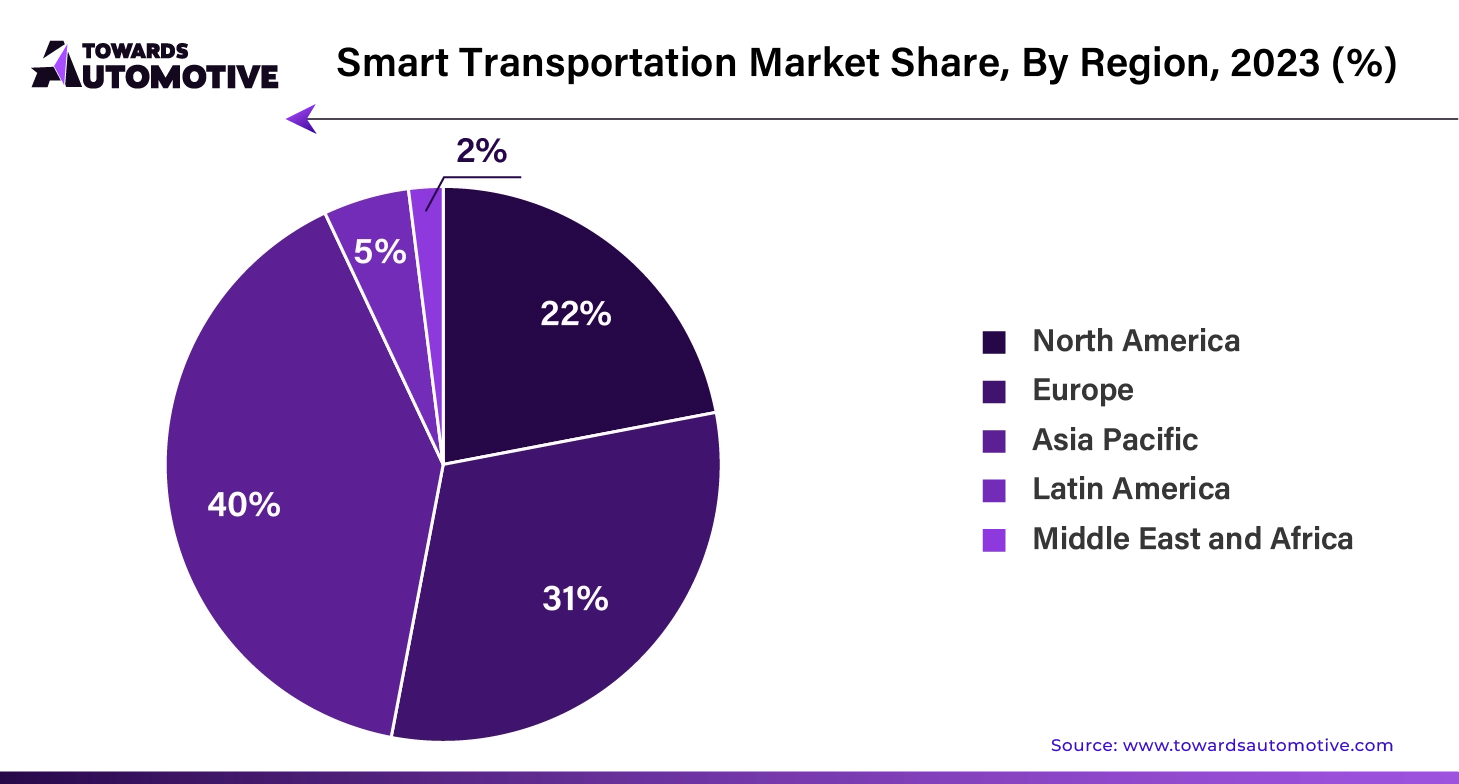
North America dominated the smart transportation market. Rising urbanization, increased demand for Mobility as a Service (MaaS), and a strong focus on sustainability are pivotal drivers of growth in the smart transportation market in North America. Urban areas across the continent are witnessing significant population influx, leading to increased congestion and a pressing need for efficient transportation solutions. As cities expand, traditional transportation systems are often ill-equipped to handle the rising demand, necessitating the adoption of smart technologies. Smart transportation systems leverage real-time data and advanced analytics to optimize traffic management, improve public transit efficiency, and enhance overall mobility.
The demand for Mobility as a Service (MaaS) has surged as urban residents seek seamless, integrated travel options. MaaS platforms combine various transportation modes—such as public transit, ride-sharing, and bike-sharing—into a single application, allowing users to plan, book, and pay for multi-modal journeys effortlessly. This holistic approach not only enhances convenience but also promotes the use of public and shared transportation, contributing to a reduction in single-occupancy vehicle trips and traffic congestion.
Moreover, the focus on sustainability is reshaping the transportation landscape in North America. Governments and municipalities are increasingly prioritizing eco-friendly transportation solutions to combat climate change and reduce greenhouse gas emissions. Smart transportation systems support this initiative by encouraging the adoption of electric vehicles (EVs), optimizing public transport routes, and enhancing non-motorized transport options such as cycling and walking. As environmental awareness grows, consumers are more inclined to embrace sustainable transportation alternatives, further fueling the demand for smart solutions.
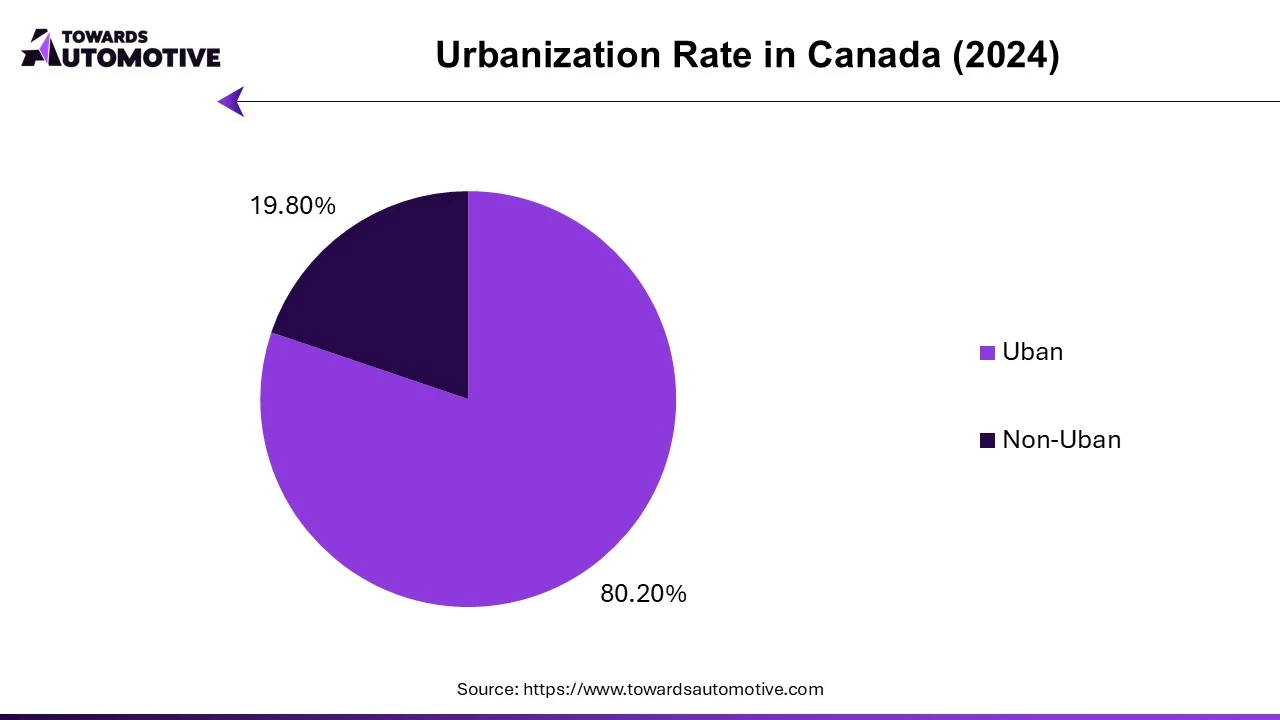
Europe is expected to grow with a significant CAGR during the forecast period. Public-Private Partnerships (PPP), significant investments in smart infrastructure, and the surge in electric vehicle (EV) sales are essential factors driving the growth of the smart transportation market in Europe. PPP initiatives have emerged as a crucial mechanism for developing advanced transportation solutions, enabling collaboration between government entities and private companies. These partnerships leverage the expertise, innovation, and financial resources of the private sector to implement smart transportation projects more efficiently. By combining efforts, stakeholders can develop integrated mobility solutions that improve public transport systems, enhance traffic management, and deploy cutting-edge technologies, such as intelligent traffic signals and real-time data analytics.
Furthermore, substantial investments in smart infrastructure are transforming the transportation landscape across Europe. Governments are prioritizing the upgrade and modernization of transportation networks to support the integration of smart technologies. This includes the installation of IoT sensors, enhanced traffic management systems, and digital platforms that facilitate real-time communication between vehicles, infrastructure, and users. These upgrades not only improve the efficiency of transportation networks but also contribute to safer and more sustainable mobility solutions.
The growing demand for electric vehicles (EVs) is another critical driver of the smart transportation market in Europe. As the European Union enforces stricter emissions regulations and offers incentives for EV adoption, the number of EVs on the road continues to rise. This increase in EV sales necessitates the expansion of charging infrastructure and the implementation of smart charging solutions, which are integral to the development of a cohesive smart transportation ecosystem. As more consumers shift to EVs, the demand for innovative charging technologies, including fast-charging stations and smart grid solutions, further propels growth in the smart transportation sector.
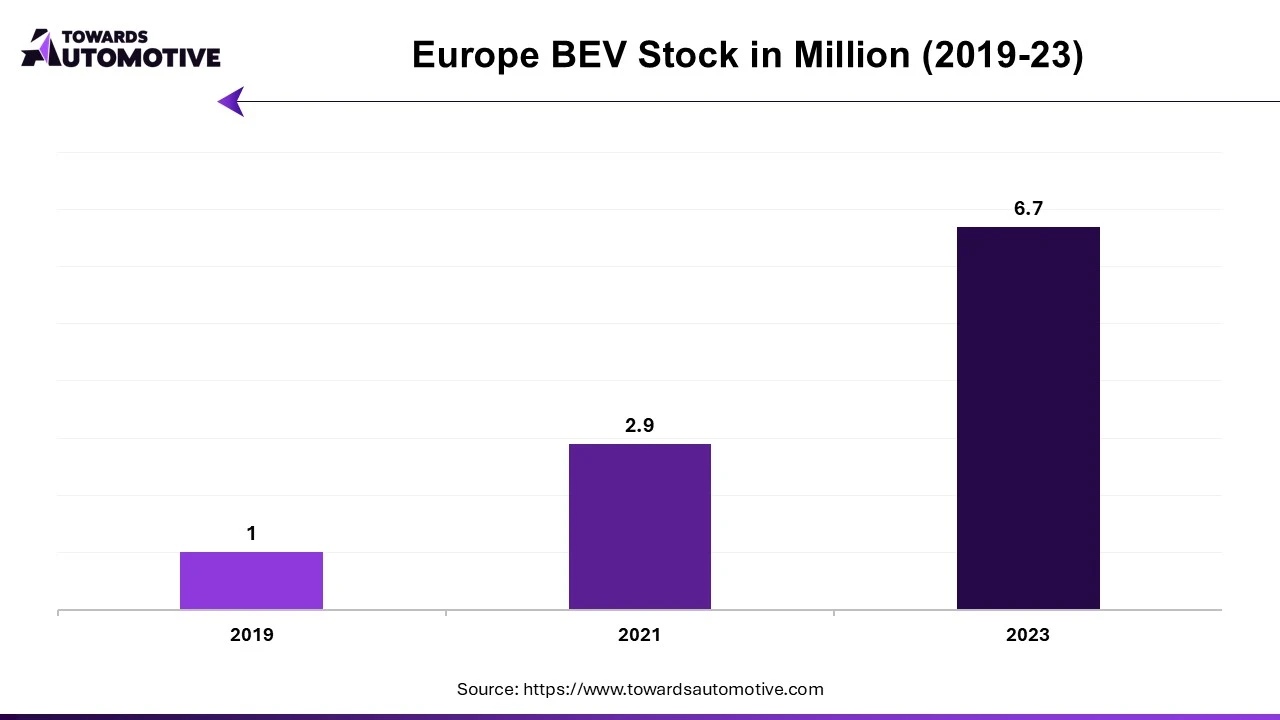
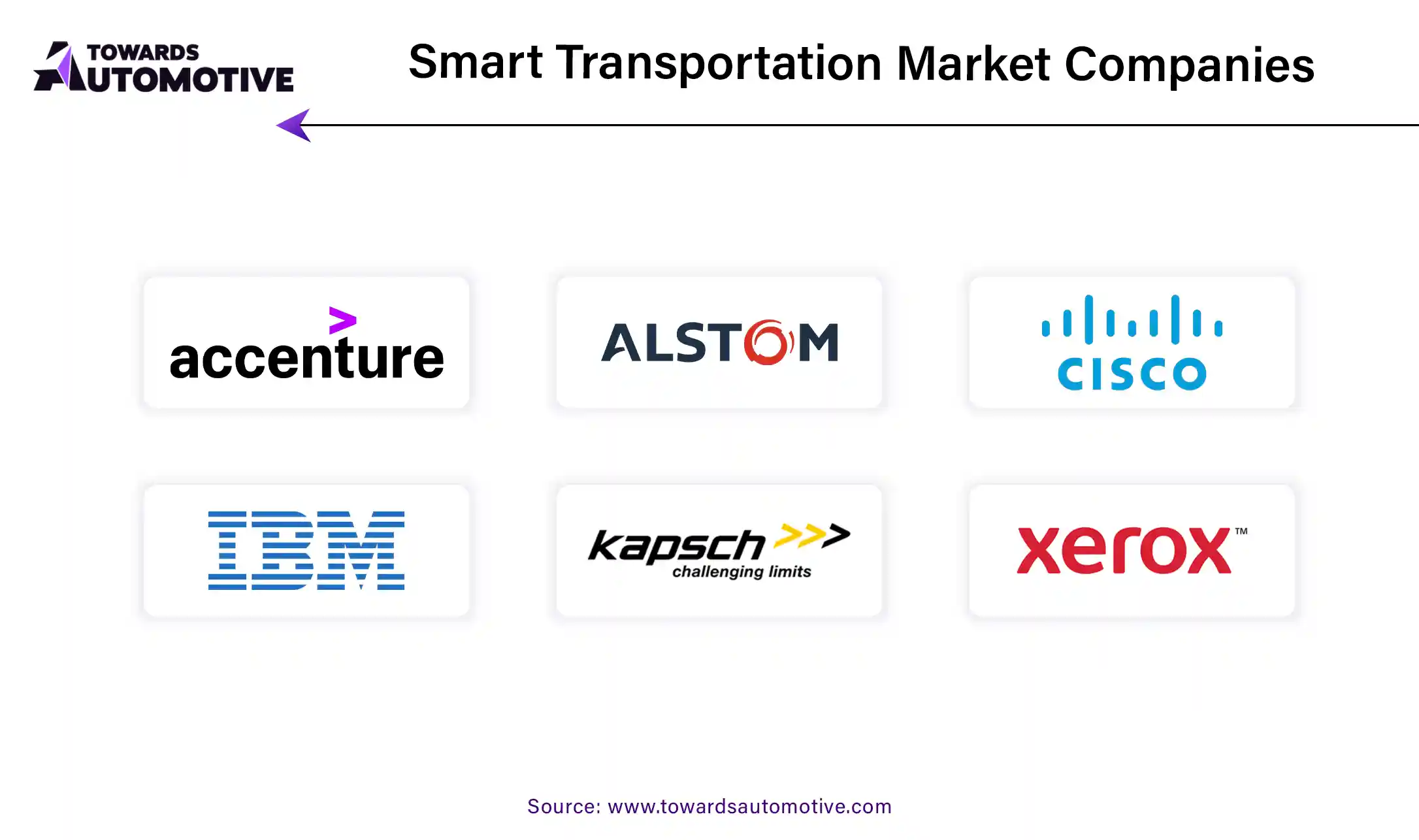
By Solution
By Services
By Region
March 2025
March 2025
March 2025
February 2025
Dr. Arjun Patel is a distinguished expert in the automotive industry, holding advanced degrees in Automotive Engineering and Mechanical Engineering. His expertise spans automotive market dynamics, technological advancements, and sustainable practices. Dr. Patel excels in conducting in depth research and analysis on market trends, consumer preferences, and the economic implications within the automotive sector. He is renowned for his insightful publications on topics such as electric vehicles, autonomous driving technologies, and the evolution of sustainable transportation solutions. Dr. Patels research contributions have significantly advanced understanding in the field, earning him recognition as a leading authority in automotive research and analysis.
We offer automotive expertise for market projections and customizable research, adaptable to diverse strategic approaches.
Contact Us